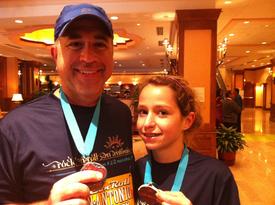Half Marathon Training.

Kiwi_09
Posts: 65 Member
I'm training for a half marathon and would love any advice that you can give.
My biggest concern is how much i'm "allowed" to eat. I have my settings on maintain current weight, and an active lifestyle plus with the amount of running I do (I run 5 days a week) I can have over 3000 calories available to me.
Should I be eating this much? What should I be eating? etc...
Any training tips are welcome too!
Thanks!
My biggest concern is how much i'm "allowed" to eat. I have my settings on maintain current weight, and an active lifestyle plus with the amount of running I do (I run 5 days a week) I can have over 3000 calories available to me.
Should I be eating this much? What should I be eating? etc...
Any training tips are welcome too!
Thanks!
0
Replies
-
The bigger question is, do you have weight to lose yet? Marathon training is more demanding on the body and so having a diet rich in whole grains is crucial. By whole grains I mean rice, quinoa, oatmeal...literally WHOLE grains. Breads and pastas are not going to really do your body a whole lot of benefit. Your calorie intake is going to have to increase because you are demanding more from your body.
Ease into this and only eat when you are hungry. Do not force feed yourself calories your body is not demanding. Just remember good quality of foods.
Strength train your glutes, hamstrings, back and shoulders! These are all crucial in your best running performance!0 -
I'm preparing for a full (this weekend). At the peak of my training I would eat nearly 3000 calories on long run day. Most other days I'm between 1800-2400. My goal was to maintain but I actually lost 5 pounds over the last month.
I did a hybrid training schedule due to my IT band issues. Typically ran 3x per week (1 long and 2 5-6 milers), did other cardio (bike/plyoHIIT) 1x per week and then strength 2x per week.0 -
I found if I ate something in the first half hour after a run then I didn't get the crazy hungry cravings I got if I didn't. Aim for something with protein - I used to have chocolate milk (I read an article somewhere that said it was a better sports drink than actual sports drinks, plus, being milk, it has some protein in it, plus I love chocolate milk and it helps me ward off the need to eat actual chocolate!!) - Edited to close the brackets! I couldn't just leave them open!!0
-
I ran my first half marathon in October - during my maintenance phase also - I would say eat it if you need to - if you are hungry - if you are prepping for a long run - you need the sustenance to maintain your energy level.
You should concentrate on eating the right kinds of foods for distance running - you can find all sorts of information on running sites for what is best - i think the recommended ratio is like 60% carbs, 20-25% protein and 20% fat or less. I tend to eat very little fat anyway. Just make sure it's good carbs and not sugary carbs. check out runners world website for a lot of great tips. I also used the Half Marathon rookie website for guidance.
Also - make sure to drink TONS - and very soon after a long run to avoid cravings and dehydration0 -
Personally, I think 3000 calories is way too much, unless you work a very physical job. I'd gain like crazy at that. I trained for a half eating around 1500-1800, depending on run length that day.0
-
Hi there! I'm also training for a half marathon and while the food is important, I've been paying a little more attention to my training schedule and figuring out what I should eat based on how I feel. I am of course not a nutritionalist or trainer, just a 30somthing woman wanting to accomplish some physical goals. I try to incorporate lots of bananas and whole grain foods as another commenter mentioned. I drink a lot of water as well. As far as my calories go, I stay on the lower end, between 1200 - 1500 a day. You mentioned that you run 5 days.. are those 5 days in a row? Are you you incorporating any weight lifting? My schedule is as follows: M: Weights Tu: Run Wed: Weights Thurs: Run Fri: Rest Sat: long run Sun: Easy run... Hope some of this is helpful for you, and good luck!0
-
The bigger question is, do you have weight to lose yet? Marathon training is more demanding on the body and so having a diet rich in whole grains is crucial. By whole grains I mean rice, quinoa, oatmeal...literally WHOLE grains. Breads and pastas are not going to really do your body a whole lot of benefit. Your calorie intake is going to have to increase because you are demanding more from your body.
Ease into this and only eat when you are hungry. Do not force feed yourself calories your body is not demanding. Just remember good quality of foods.
Strength train your glutes, hamstrings, back and shoulders! These are all crucial in your best running performance!
I probably will lose weight.. or at least fat. I'm around 140lbs & 5'9. I don't own a scale and I'm not too concerned about weight loss.
The marathon isn't until october and I'm not quite at the whole 20+KM level yet. I ran for an hour today and my suggested intake is already around 3000 so once I start doing even longer runs I can only imagine what it'll tell me to take it.
I like rice, quinoa and oatmeal so I'll stock up on that!0 -
I'm training for a half marathon and would love any advice that you can give.
My biggest concern is how much i'm "allowed" to eat. I have my settings on maintain current weight, and an active lifestyle plus with the amount of running I do (I run 5 days a week) I can have over 3000 calories available to me.
Should I be eating this much? What should I be eating? etc...
You're allowed to eat as much as you need to maintain your weight. I'm eating between 3000 and 4000 calories on running days. If you're trying to lose weight and train then just cut yourself short about 500 calories a day. You can do both at the same time.
I have my settings on maintenance and I put my lifestyle as sedentary. This is accurate for the days that I don't run. I track calories burned with a HRM and add those in to my daily calorie requirements. I think this works best because the amount of running varies from one day to the next and depending on the wind outside you can burn 200 - 300 more calories on the same run from day to day.
What should you eat? Try to work in a gram of protein for each pound of lean body mass you have. After that just eat lots of good healthy foods and the macros nearly take care of themselves.0 -
Hi there! I'm also training for a half marathon and while the food is important, I've been paying a little more attention to my training schedule and figuring out what I should eat based on how I feel. I am of course not a nutritionalist or trainer, just a 30somthing woman wanting to accomplish some physical goals. I try to incorporate lots of bananas and whole grain foods as another commenter mentioned. I drink a lot of water as well. As far as my calories go, I stay on the lower end, between 1200 - 1500 a day. You mentioned that you run 5 days.. are those 5 days in a row? Are you you incorporating any weight lifting? My schedule is as follows: M: Weights Tu: Run Wed: Weights Thurs: Run Fri: Rest Sat: long run Sun: Easy run... Hope some of this is helpful for you, and good luck!
I take thursdays and saturdays off from running. I bike or walk to work so I'm still getting some kind of exercise but it's less time and lower impact on those days. I haven't been doing any actual weight lifting. I have a yoga DVD that I do to help stretch out which incorporates body weight training... should I be doing more weight training?0 -
I highly recomend not eating any dairy products or any type fried food before a run. Chocolate milk is the most AWESOME recovery beverage ever (for me). If you have the time, eat your planned meal (or snack) then wait at least a half an hour to an hour before you run. If you're on a time crunch, keep it simple. PB and a slice of sprouted wheat bread toast, maybe half an apple nothing too acidic.
Good luck with your half marathon trainning!0 -
I probably will lose weight.. or at least fat. I'm around 140lbs & 5'9. I don't own a scale and I'm not too concerned about weight loss.
The marathon isn't until october and I'm not quite at the whole 20+KM level yet. I ran for an hour today and my suggested intake is already around 3000 so once I start doing even longer runs I can only imagine what it'll tell me to take it.
I like rice, quinoa and oatmeal so I'll stock up on that!
Do you use the default MFP burns for running or enter in a HRM calculation? I was getting 3000 calories per day only when my long runs were approaching 3 hours. I am 5'6", 130 lbs. So 3000 does seem a bit high if you are only running an hour.0 -
I probably will lose weight.. or at least fat. I'm around 140lbs & 5'9. I don't own a scale and I'm not too concerned about weight loss.
The marathon isn't until october and I'm not quite at the whole 20+KM level yet. I ran for an hour today and my suggested intake is already around 3000 so once I start doing even longer runs I can only imagine what it'll tell me to take it.
I like rice, quinoa and oatmeal so I'll stock up on that!
Do you use the default MFP burns for running or enter in a HRM calculation? I was getting 3000 calories per day only when my long runs were approaching 3 hours. I am 5'6", 130 lbs. So 3000 does seem a bit high if you are only running an hour.
I use a HRM ... My basic intake is supposed to be 1930 plus after my hour run was 651 so I'm at 2581... I also usually walk or bike to work so if I add that I'm getting even closer to the 3000 mark. I checked my settings and I'm actually set at "light active" and if anything my work is more active then that since I'm a waitress & I work promotions, so I'm usually on my feet and if I'm setting up for events I'm lifting equipment, etc.0 -
I use a HRM ... My basic intake is supposed to be 1930 plus after my hour run was 651 so I'm at 2581... I also usually walk or bike to work so if I add that I'm getting even closer to the 3000 mark. I checked my settings and I'm actually set at "light active" and if anything my work is more active then that since I'm a waitress & I work promotions, so I'm usually on my feet and if I'm setting up for events I'm lifting equipment, etc.
Then the 2500-3000 is probably realistic for you. If you haven't been eating that much adjust slowly. Listen to your body. When I try to do long run without adequate fueling I feel very sluggish and legs are like lead before 6 miles. (Some people incorporate the "fasted running" into their training to simulate the last miles of a long race or to prevent GI issues, it's a personal decision and I've seen success both ways). Also important to refuel afterwards when your body is repairing itself - protein + carbs.0 -
I found, in the middle of my training cycles, I would need more and more protein. I am not a big red meat eater by nature, but my body would scream for protein. I lost during training cycles some times and maintained others. I think you need to listen to your body. There was just something extra delicious some nights about that steak I had been craving....
I also started doing a modified version of the ice baths. i would go sit in the lake (which in Washington state is like ice during the winter), and it really did make a difference for me afterwards!0 -
As a marathon runner and triathlete, I can safely say that one of the biggest mistakes people make is overloading on calories and food so early on, especially if you want to lose weight or even maintain weight and hence why some people actually put on a lot of weight.
Training for even a half, you really don't need to overload on calories for training as you aren't going to be running 13 miles a day every single day.
The best thing, genuinely, is to get yourself a runner's handbook (I always consult this when it comes to my big events) to tailor the training plan and nutrition. There are tonnes out there.
Yes you need to FUEL your body but this also means the QUALITY of food as well and just because you are training, it doesn't mean you blowout on calories every day.
You:
1. Need to tailor your training plan
2. THEN workout for your body (type, height etc) and goals of maintaining or losing weight
3. Test which foods you run better on, while still incorporating the RIGHT fuel foods (for instance, I cannot run on a full stomach, so I have to carbo load the night before the race and only take a small amount in the morning)0 -
When I was running half marathons, I was able to lose weight but when training for a full marathon I found the nutrition requirement/calorie cravings did not allow weight loss. If you are eating healthily and not overdoing it but exercising properly, it all should work out. You do need energy to run--that's for sure--your body will tell you the right amount. Also, before the race don't eat in a different manner than you usually do--often people drink too many sports drinks, etc. and then feel nauseous during their first race.0
This discussion has been closed.
Categories
- All Categories
- 1.4M Health, Wellness and Goals
- 398.2K Introduce Yourself
- 44.7K Getting Started
- 261K Health and Weight Loss
- 176.4K Food and Nutrition
- 47.7K Recipes
- 233K Fitness and Exercise
- 462 Sleep, Mindfulness and Overall Wellness
- 6.5K Goal: Maintaining Weight
- 8.7K Goal: Gaining Weight and Body Building
- 153.5K Motivation and Support
- 8.4K Challenges
- 1.4K Debate Club
- 96.5K Chit-Chat
- 2.6K Fun and Games
- 4.8K MyFitnessPal Information
- 12 News and Announcements
- 21 MyFitnessPal Academy
- 1.6K Feature Suggestions and Ideas
- 3.2K MyFitnessPal Tech Support Questions










